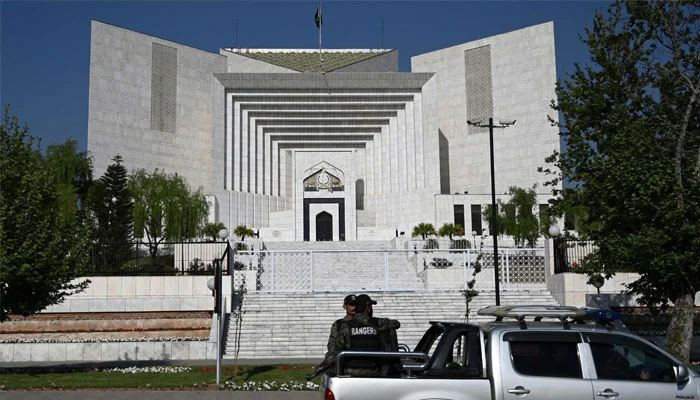
Justice Mazahar Alam Khan Miankhel, who retired on July 13, in an additional note issued alongside the Supreme Court's larger verdict regarding a plea by Pakistan Tehreek-e-Insaf (PTI), has said that the ruling given by the former deputy speaker Qasim Suri on April 3, could be a violation of Article 6 (high treason).
The Supreme Court has issued a detailed verdict, rejecting the plea of PTI seeking a judicial probe into the alleged 'foreign conspiracy' to topple the Imran Khan government.
“Whether these acts attract Article 6 of the Constitution (high treason) is also left open to be determined by the parliamentarians to ponder should they leave open the doors for such unconstitutional acts or take suitable measures to stop such like mess in future,” Justice Miankhel suggested.
In a tweet, journalist Mubashir Zaidi shared a page of the verdict and wrote: “The decision said that the Imran Khan-led government itself did not form a commission of inquiry and requested the apex court to set up a judicial commission.
Commenting on the development, legal expert Reema Omer said: “SC detailed judgment on VONC is a strong indictment against PTI’s ‘regime change’ propaganda. Among other things, court says allegations are vague …. and aren’t backed by evidence. Also questions why PTI government didn’t conduct an inquiry when it had a chance.”
Journalist Asma Shirazi tweeted: “So, after Supreme Court’s detailed judgement, the ‘conspiracy’ theory as propagated by former PM Imran Khan is deemed as presumptive, thus rejected.”
Earlier on May 12, President Dr Arif Alvi had penned a letter to Chief Justice of Pakistan Umar Ata Bandial, urging him to constitute a judicial commission to investigate the alleged conspiracy, which former prime minister Imran Khan claims was behind his ouster from the top office.
The president had suggested to the CJP that the proposed judicial commission should preferably be headed by him and must conduct open hearings to "thoroughly probe the allegations of regime change conspiracy to avert a political and economic crisis in the country".
The president had pointed out that the Supreme Court had taken such initiatives in the past to constitute judicial commissions in matters of national security, integrity, sovereignty and public interest.
The Supreme Court has issued a detailed verdict, rejecting the plea of PTI seeking a judicial probe into the alleged 'foreign conspiracy' to topple the Imran Khan government.
“Whether these acts attract Article 6 of the Constitution (high treason) is also left open to be determined by the parliamentarians to ponder should they leave open the doors for such unconstitutional acts or take suitable measures to stop such like mess in future,” Justice Miankhel suggested.
In a tweet, journalist Mubashir Zaidi shared a page of the verdict and wrote: “The decision said that the Imran Khan-led government itself did not form a commission of inquiry and requested the apex court to set up a judicial commission.
سپریم کورٹ نے امریکی سازش کی تحقیقات کے لئے @PTIofficial اور @ImranKhanPTI کی کمیشن بنانے کی درخواست رد کرنے کا تفصیلی فیصلہ جاری کر دیا۔ فیصلے میں کہا گیا کہ عمران حکومت نے خود انکوائری کمیشن نہیں بنایا اور سپریم کورٹ کو عداتی کمیشن بنانے کی درخواست دی pic.twitter.com/7UeqZbDwWM
— Mubashir Zaidi (@Xadeejournalist) July 13, 2022
Commenting on the development, legal expert Reema Omer said: “SC detailed judgment on VONC is a strong indictment against PTI’s ‘regime change’ propaganda. Among other things, court says allegations are vague …. and aren’t backed by evidence. Also questions why PTI government didn’t conduct an inquiry when it had a chance.”
Journalist Asma Shirazi tweeted: “So, after Supreme Court’s detailed judgement, the ‘conspiracy’ theory as propagated by former PM Imran Khan is deemed as presumptive, thus rejected.”
Earlier on May 12, President Dr Arif Alvi had penned a letter to Chief Justice of Pakistan Umar Ata Bandial, urging him to constitute a judicial commission to investigate the alleged conspiracy, which former prime minister Imran Khan claims was behind his ouster from the top office.
The president had suggested to the CJP that the proposed judicial commission should preferably be headed by him and must conduct open hearings to "thoroughly probe the allegations of regime change conspiracy to avert a political and economic crisis in the country".
The president had pointed out that the Supreme Court had taken such initiatives in the past to constitute judicial commissions in matters of national security, integrity, sovereignty and public interest.

